Oversoul
The Tentacled One
At some point last week, I watched this video. The things is rather long, but it's basically a discussion on things that the speakers believe EDH players should stop doing. Some of them are references to gameplay mistakes that they perceive as being common, and others are general etiquette things. I think that overall, their ideas are a mixed bag. But that's not important. You can watch the whole video if you like, but the part that caught my interest was their complaint about players conceding "at instant speed."
While I imagine that gameplay-affecting concessions have been frustrating for some players in some scenarios, I think this is actually the first time I've seen it mentioned in the context of admonishment, of "Don't do that." My first reaction was to simply disagree with the guys in the video, but I don't want to dismiss the notion out-of-hand. So I was wondering what others thought about it...
In my case, I haven't seen much of this in EDH anyway, but it's definitely happened in other multiplayer settings. Actually, I think the majority of the (gameplay-impacting) instances of "instant speed" concessions I observed were with the card Spirit Link.
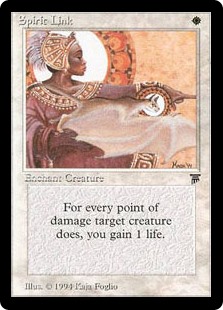
Not lifelink, because it didn't exist yet. I vividly remember that Spirit Link was enormously popular when I was younger, and it was reprinted in 4th Edition and 5th Edition (as well as some later core sets), so it was readily available and showed up in most casual multiplayer games I was in. I have fond memories of those games in the late 1990's, and I think I've got a bit of an instinctive response against the commentary in the video because of the implication that my friends were wrong to be doing what they were doing, not a in a rules sense, but in terms of some decorum we never knew existed.
Honestly, when I was directly affected by this, it was mostly because of my use of Donate + Illusions of Grandeur...
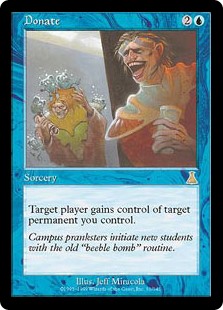
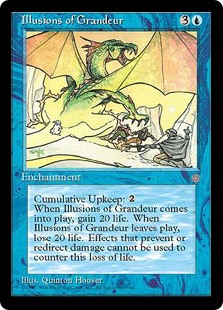
It's not really applicable to EDH, but the principle is the same. I'd try to Donate an Illusions to a player, and that player would concede so as to leave me stuck with the Illusions. I was using Necropotence anyway and in all instances I can remember, I was still able to Donate the Illusions to another player. But it was probably the best chance that the other players in the game had of stopping me. It was logical and I never faulted them for trying.
The example they alluded to in the video involved the combo of Inalla, Archmage Ritualist + Wanderwine Prophets...
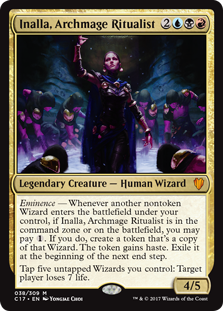
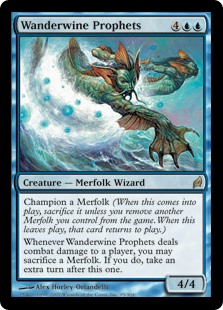
So Player A has Inalla as commander and casts Wanderwine Prophets, then uses Inalla's ability to make a token copy. The token copy champions the original. Perhaps Player C and Player D have blockers, but Player B is open, so Player A attacks Player B, then sacrifices the token to take an extra turn. The original Wanderwine Prophets comes back, Player A uses Inalla's ability again, and has the token champion the original again. The end step comes, the token is exiled, the original Wanderwine Prophets comes back again, and Player A once again uses Inalla's ability to make a token copy and have it champion the original Prophets. Then Player A gets another turn, and can repeat the process. It's a finite loop because the 4/4 tokens will eventually kill Player B, but Player A presumably gets enough extra turns to find more cards and can prepare to kill Player C and Player D once Player B is dead and the extra turns have run out. If Player A can find a way to get rid of blockers by bouncing/killing them, the loop could continue with more extra turns.
Seeing this and being able to predict how it would play out, Player B might concede after the first token copy of Wanderwine Prophets is already attacking, but before combat damage. The loop would "fizzle" and Player A would probably have to pass the turn to Player C, who might proceed to administer a righteous beating onto Player A. And hypothetically, if I were Player B, I'd assume that I'd take exactly that action. And I thought most people I knew would do the same. Now I'm finding that some players (i.e. the ones in this video) consider such a concession to be bad mannered. They are fully aware that yes, it's within the rules for players to do this, but their argument is that players should not do it. In the hypothetical example, Player A has earned extra turns and is entitled to them.
In my head, the way it worked in multiplayer games was that concession was tantamount to "planeswalking away." The "flavor" tie-in to the rules was that players could sever their magical ties to the realm corresponding to the field of battle at any time. This link was maintained of the planeswalker's own volition and if they chose to break it, nothing else was faster than it. That also explained what happened to the planeswalker's stuff when the planeswalker was gone and the battle still continued. I really can't remember where I ever came to think of it in this way. Perhaps I conjured the image on my own as a way to rationalize the multiplayer rules.
So I tried to give the guys in the video a fair hearing on this subject. They seemed very convinced that for players to concede "at instant speed" is poor sportsmanship. And after hearing them out, I guess I kinda came to the opposite conclusion: that they've contrived their own standard with no basis in the rules and that their attempts to use rhetoric and social ostracization to enforce this standard are mildly rude and smack of a false sense of entitlement. Even so, I'm worried that this is a knee-jerk reaction on my part. It's not so much that I've use "instant" concession myself (I have), but more that I had it done to me by old friends I've mostly lost contact with (at least one of whom is now dead), and maybe I'm being unfairly defensive because of that.
Anyway, I'd seriously never heard of this as being a "bad" thing before, so I wanted to see what the ideas on the matter were here at the CPA. We've had it happen here in Games Run (most recent example was, I think, me doing it in Explorers of Ixalan) and I'd imagine that most, if not all, of you have seen it at some point in your casual playgroups. Is it perfectly acceptable in your playgroups? Taboo? If it's not taboo for you, do you have any sympathy for the people who do view it in that way?
While I imagine that gameplay-affecting concessions have been frustrating for some players in some scenarios, I think this is actually the first time I've seen it mentioned in the context of admonishment, of "Don't do that." My first reaction was to simply disagree with the guys in the video, but I don't want to dismiss the notion out-of-hand. So I was wondering what others thought about it...
In my case, I haven't seen much of this in EDH anyway, but it's definitely happened in other multiplayer settings. Actually, I think the majority of the (gameplay-impacting) instances of "instant speed" concessions I observed were with the card Spirit Link.
Not lifelink, because it didn't exist yet. I vividly remember that Spirit Link was enormously popular when I was younger, and it was reprinted in 4th Edition and 5th Edition (as well as some later core sets), so it was readily available and showed up in most casual multiplayer games I was in. I have fond memories of those games in the late 1990's, and I think I've got a bit of an instinctive response against the commentary in the video because of the implication that my friends were wrong to be doing what they were doing, not a in a rules sense, but in terms of some decorum we never knew existed.
Honestly, when I was directly affected by this, it was mostly because of my use of Donate + Illusions of Grandeur...
It's not really applicable to EDH, but the principle is the same. I'd try to Donate an Illusions to a player, and that player would concede so as to leave me stuck with the Illusions. I was using Necropotence anyway and in all instances I can remember, I was still able to Donate the Illusions to another player. But it was probably the best chance that the other players in the game had of stopping me. It was logical and I never faulted them for trying.
The example they alluded to in the video involved the combo of Inalla, Archmage Ritualist + Wanderwine Prophets...
So Player A has Inalla as commander and casts Wanderwine Prophets, then uses Inalla's ability to make a token copy. The token copy champions the original. Perhaps Player C and Player D have blockers, but Player B is open, so Player A attacks Player B, then sacrifices the token to take an extra turn. The original Wanderwine Prophets comes back, Player A uses Inalla's ability again, and has the token champion the original again. The end step comes, the token is exiled, the original Wanderwine Prophets comes back again, and Player A once again uses Inalla's ability to make a token copy and have it champion the original Prophets. Then Player A gets another turn, and can repeat the process. It's a finite loop because the 4/4 tokens will eventually kill Player B, but Player A presumably gets enough extra turns to find more cards and can prepare to kill Player C and Player D once Player B is dead and the extra turns have run out. If Player A can find a way to get rid of blockers by bouncing/killing them, the loop could continue with more extra turns.
Seeing this and being able to predict how it would play out, Player B might concede after the first token copy of Wanderwine Prophets is already attacking, but before combat damage. The loop would "fizzle" and Player A would probably have to pass the turn to Player C, who might proceed to administer a righteous beating onto Player A. And hypothetically, if I were Player B, I'd assume that I'd take exactly that action. And I thought most people I knew would do the same. Now I'm finding that some players (i.e. the ones in this video) consider such a concession to be bad mannered. They are fully aware that yes, it's within the rules for players to do this, but their argument is that players should not do it. In the hypothetical example, Player A has earned extra turns and is entitled to them.
In my head, the way it worked in multiplayer games was that concession was tantamount to "planeswalking away." The "flavor" tie-in to the rules was that players could sever their magical ties to the realm corresponding to the field of battle at any time. This link was maintained of the planeswalker's own volition and if they chose to break it, nothing else was faster than it. That also explained what happened to the planeswalker's stuff when the planeswalker was gone and the battle still continued. I really can't remember where I ever came to think of it in this way. Perhaps I conjured the image on my own as a way to rationalize the multiplayer rules.
So I tried to give the guys in the video a fair hearing on this subject. They seemed very convinced that for players to concede "at instant speed" is poor sportsmanship. And after hearing them out, I guess I kinda came to the opposite conclusion: that they've contrived their own standard with no basis in the rules and that their attempts to use rhetoric and social ostracization to enforce this standard are mildly rude and smack of a false sense of entitlement. Even so, I'm worried that this is a knee-jerk reaction on my part. It's not so much that I've use "instant" concession myself (I have), but more that I had it done to me by old friends I've mostly lost contact with (at least one of whom is now dead), and maybe I'm being unfairly defensive because of that.
Anyway, I'd seriously never heard of this as being a "bad" thing before, so I wanted to see what the ideas on the matter were here at the CPA. We've had it happen here in Games Run (most recent example was, I think, me doing it in Explorers of Ixalan) and I'd imagine that most, if not all, of you have seen it at some point in your casual playgroups. Is it perfectly acceptable in your playgroups? Taboo? If it's not taboo for you, do you have any sympathy for the people who do view it in that way?
